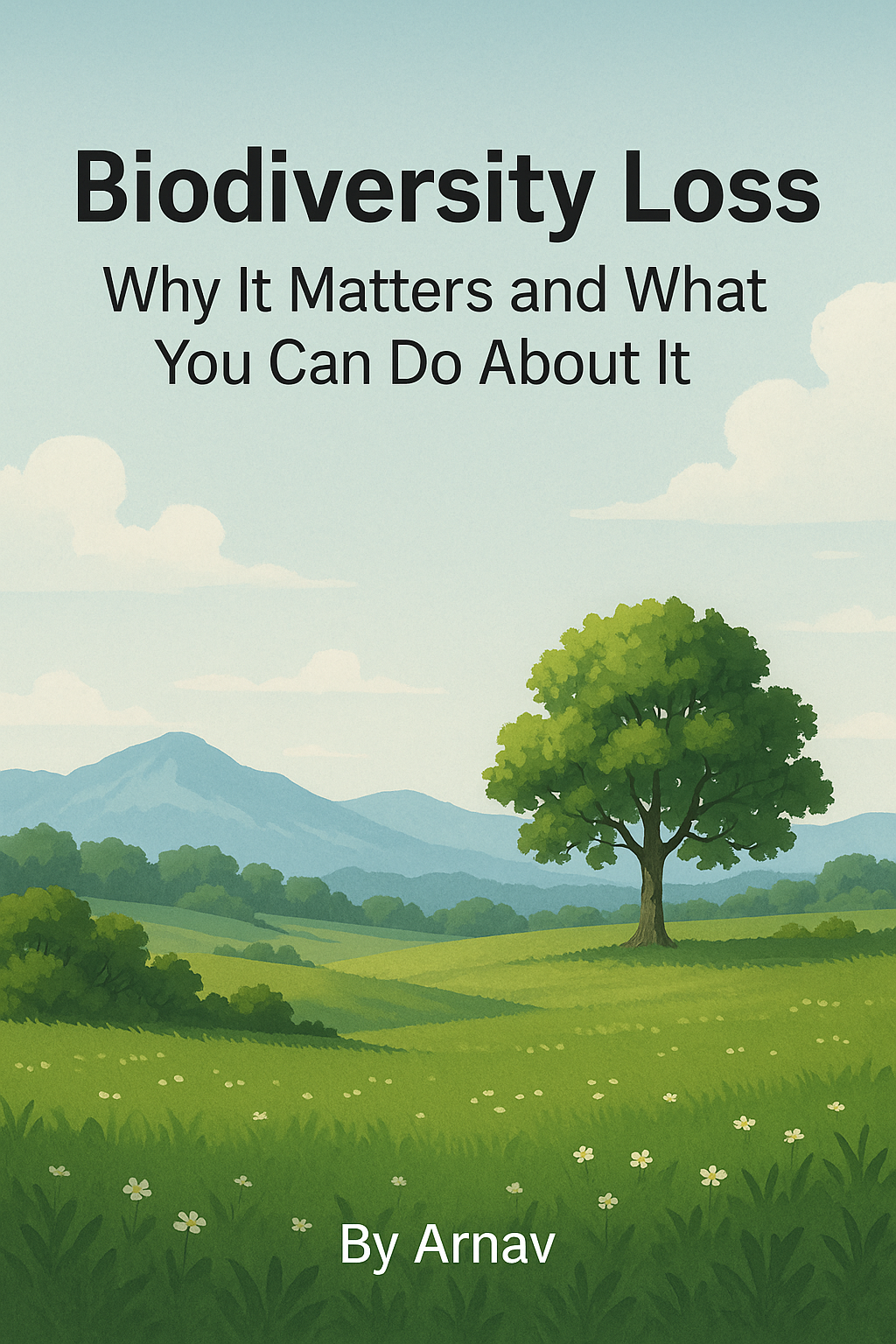Biodiversity Loss: Why It Matters and What You Can Do About It
Ever taken a walk in a park and realized you’re hearing fewer birdsongs or seeing fewer butterflies than you remember from childhood? That’s not nostalgia playing tricks on you — it’s a very real sign of biodiversity loss, and it’s closer to home than you think.
As freelancers, startup founders, and changemakers, you’re already wired to create impact. But while you're busy building your careers or scaling your ideas, there's a quiet crisis unfolding — and it affects everything from your morning coffee to your weekend hikes.
Let’s dive into what biodiversity loss really means, why it matters, and what you can do (yes, you!) to help.
🌍 What Is Biodiversity and Why Should You Care?
Biodiversity is the variety of all living things on Earth — from the tiniest microbes in the soil to the blue whales in the ocean. It’s what makes ecosystems stable, productive, and resilient. Without it, food systems collapse, disease spreads faster, and even business supply chains become vulnerable.
Think of biodiversity as nature’s safety net. When threads of that net begin to snap, the whole system is at risk — including us.
❌ Mistake 1: Thinking Biodiversity Loss Is a "Nature Problem"
The Issue:
Many people assume biodiversity is only a concern for scientists, farmers, or tree-huggers. The reality? It touches every industry — from tech to tourism.
If you're a freelancer working remotely, your ability to thrive depends on a stable environment: clean water, fresh food, and a functioning climate. If you're an early-stage founder building a sustainable business, your supply chain, consumer base, and long-term growth are all linked to ecological health.
Fix: Understand the business case for biodiversity
-
Read up on ESG (Environmental, Social, Governance) practices that affect investment trends.
-
Explore how biodiversity links to climate change, food security, and economic stability.
-
Follow organizations like UNEP or WWF on LinkedIn or Twitter to stay in the loop.
❌ Mistake 2: Believing It's Too Big a Problem to Solve
The Issue:
It’s easy to feel overwhelmed. One person versus a planet’s worth of species extinction? That math feels discouraging. But action — especially collective action — is how change starts.
Fix: Start small but intentional
-
Switch to sustainable products (think: bamboo, recycled materials, local produce).
-
Join or support grassroots environmental efforts, even digitally.
-
Use your platform — a blog, a podcast, a newsletter — to talk about these issues and spark awareness.
Bonus Tip: If you're building a startup, consider aligning with Sustainable Development Goal #15: Life on Land. It's an easy way to add purpose and attract eco-conscious customers.
❌ Mistake 3: Ignoring the Role of Urbanization
The Issue:
Cities are biodiversity hotspots — but only if we plan them right. Unchecked urban growth leads to habitat destruction, pollution, and monoculture landscapes. Unfortunately, many startups and digital nomads overlook this in the excitement of building urban communities or coworking spaces.
Fix: Support green infrastructure
-
Advocate for or invest in urban green spaces, rooftop gardens, and biodiversity corridors.
-
Encourage sustainable development principles in coworking offices or event spaces.
-
Add eco-friendly policies in your startup's office design — even small things like native indoor plants or using reclaimed wood help.
❌ Mistake 4: Supporting Harmful Consumer Trends
The Issue:
Fast fashion, imported foods, and electronics with rare metals — all of these trends contribute to biodiversity loss. Often, the harm happens far from where we live, so it feels invisible.
Fix: Be a conscious consumer and creator
-
Choose brands with transparent, ethical sourcing practices.
-
Promote minimalism in your personal and business life.
-
If you create content or run a brand, highlight sustainability in your messaging.
Example: If you sell digital products, consider planting trees for every download or using green hosting platforms.
❌ Mistake 5: Not Including Nature in Your Daily Routine
The Issue:
Disconnecting from nature is a huge driver of biodiversity loss. If we don’t see or value nature daily, it fades from our priorities — and from our policies.
Fix: Build nature into your workflow
-
Take walking meetings in green spaces or parks.
-
Work from biodiversity-friendly cafés or community gardens.
-
Set up “nature breaks” in your workday to reconnect and de-stress.
✅ What Can You Do Today?
Here are a few actionable steps you can take today to be part of the solution:
-
🌱 Offset your carbon footprint through verified programs.
-
🛒 Buy local and seasonal foods — they support biodiversity-rich farms.
-
🐝 Plant pollinator-friendly plants on your balcony or window box.
-
🤝 Collaborate with eco-conscious partners and freelancers.
-
📢 Use your voice — write blogs, host webinars, or speak on panels about sustainability.
🧠 Final Thoughts: The Future Is Wild — If We Let It Be
Biodiversity isn’t just about saving pandas or planting more trees (though those are great too). It’s about preserving the balance that makes all life — including human innovation and enterprise — possible.
As freelancers, founders, and environmental advocates, you’re already in the habit of building things from scratch. Let’s make biodiversity part of your blueprint — not just an afterthought.
Together, we can build businesses and lives that are not only profitable but also planet-positive.
📣 Your Turn: Share, Reflect, and Act
If this resonated with you, here’s what to do next:
-
Share this post with a fellow creator, freelancer, or team.
-
Reflect on one biodiversity-related habit you can change this week.
-
Follow a conservation org or subscribe to a biodiversity newsletter.
-
Leave a comment or DM — what’s one action you’re taking today?
Let's not just talk about saving the planet — let’s actually do something.
Need help making your brand or startup eco-conscious? Let’s chat. I love helping people align profit with planet. 🌿

